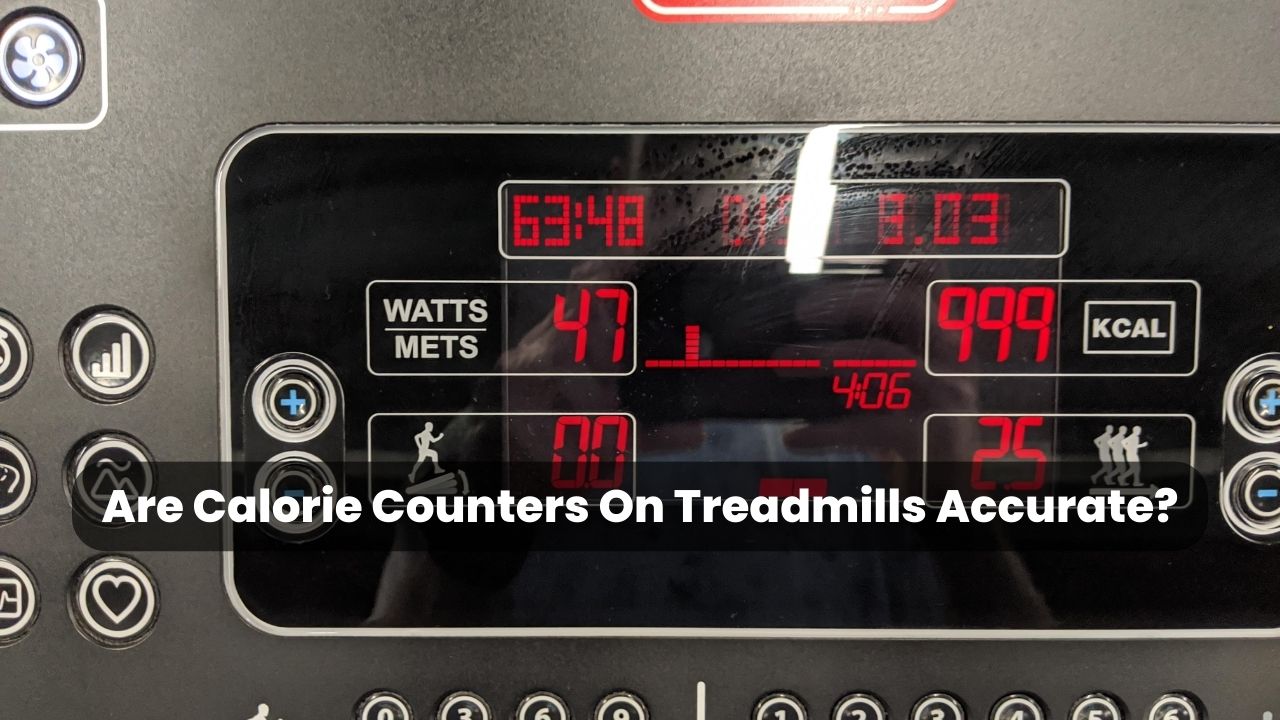In Short: Treadmill calorie counters are generally accurate, but they may overestimate or underestimate calories burned depending on the individual’s weight, the intensity of the workout, and the calibration of the machine.
If you’ve ever used a treadmill, you might have noticed that it displays how many calories you’ve burned during your workout.
But how accurate are these numbers? And can you trust them to track your fitness goals?
Table of Contents
How Calorie Counters On Treadmills Work?
Calorie counters on treadmills are based on algorithms that estimate how much energy you expend based on weight, speed, incline, and time.
Here are some factors that can affect the accuracy of treadmill calorie counters:
- Weight: Heavier people burn more calories than lighter people when exercising at the same intensity. Therefore, a treadmill calorie counter that is accurate for a 150-pound person may overestimate calories burned for a 250-pound person.
- Intensity: The intensity of the workout also affects the number of calories burned. A treadmill calorie counter that is accurate for a leisurely walk may underestimate calories burned for a vigorous run.
- Calibration: Treadmill calorie counters can become less accurate over time if they are not properly calibrated. It is important to have your treadmill calibrated regularly, especially if it is not used frequently.
In addition to the factors mentioned above, the following can also affect the accuracy of treadmill calorie counters:
- Your body composition: People with more muscle mass burn more calories than people with less muscle mass.
- Your fitness level: As you get fitter, you will burn fewer calories for the same amount of exercise.
- Your clothing: Wearing loose-fitting clothing will help the treadmill calculate your calories more accurately.
- The incline: Incline increases the number of calories burned.
However, these factors don’t account for other variables that affect your calorie burn, such as:
- Your age, gender, height, and body composition
- Your fitness level and your resting metabolic rate
- Your heart rate and exercise intensity
- The type and quality of the treadmill
- Environmental conditions, such as temperature and humidity
All of these factors can influence how many calories you actually burn on a treadmill, and they can vary widely from person to person.
For example, a 150-pound person running at 6 mph for 30 minutes might burn anywhere from 270 to 400 calories, depending on their individual characteristics and the treadmill they use.
How Accurate are Planet Fitness Treadmills Calories?
Many people ask me that, are Planet Fitness treadmills accurate. Here is the answer:
The accuracy of calorie counters on treadmills, including those at Planet Fitness, can vary depending on a number of factors, including the individual’s weight, the intensity of the workout, and the calibration of the machine.
In general, Planet Fitness treadmill calorie counters are considered to be reasonably accurate, but they are not perfect.
One study found that treadmill calorie counters overestimated calories burned by about 10%.
Another study found that the accuracy of treadmill calorie counters can vary depending on the brand and model of the machine.
Tips to Get More Accurate Data
If you are concerned about the accuracy of your treadmill calorie counter, you can try using a different method to track your calories, such as a heart rate monitor or a fitness tracker. You can also talk to your doctor or a registered dietitian for more information.
Use a heart rate monitor
A heart rate monitor can measure how intensely you’re working and adjust your calorie estimate accordingly. Some treadmills have built-in heart rate sensors, but they may not be very accurate or comfortable to use. A chest strap or wristband monitor might be more reliable and convenient.
Enter your personal information
Some treadmills allow you to enter your age, gender, weight, and height before starting your workout. This can help the algorithm tailor the calorie estimate to your profile. However, remember that this still won’t account for all the variables that affect your calorie burn.
Use an online calculator or app
There are many online tools and apps that can help you calculate your calorie burn based on your activity, duration, intensity, and personal information. Some examples are MyFitnessPal, Runkeeper, and MapMyRun. These tools can also help you track your progress and set goals.
Consult a professional
If you want a more precise measurement of your calorie burn, you might want to consult a fitness professional or a registered dietitian. They can perform tests such as a VO2 max test or a metabolic rate test. This is to determine how efficiently your body uses oxygen and energy during exercise. They can also give you personalized advice on optimizing your workouts and nutrition for your goals.
Here are some tips for getting the most accurate calorie count from your treadmill:
- Use a treadmill that is properly calibrated.
- Set the treadmill to the correct speed and incline.
- Wear loose-fitting clothing.
- Don’t hold on to the side rails while you are exercising.
- Take breaks if you need to.
Conclusion
Treadmill calorie counters can be a helpful tool for tracking your progress, but it is important to keep in mind that they are not perfect.
The best way to determine how many calories you are burning is to use a combination of methods, such as tracking your weight, using a heart rate monitor, and monitoring your energy levels.
